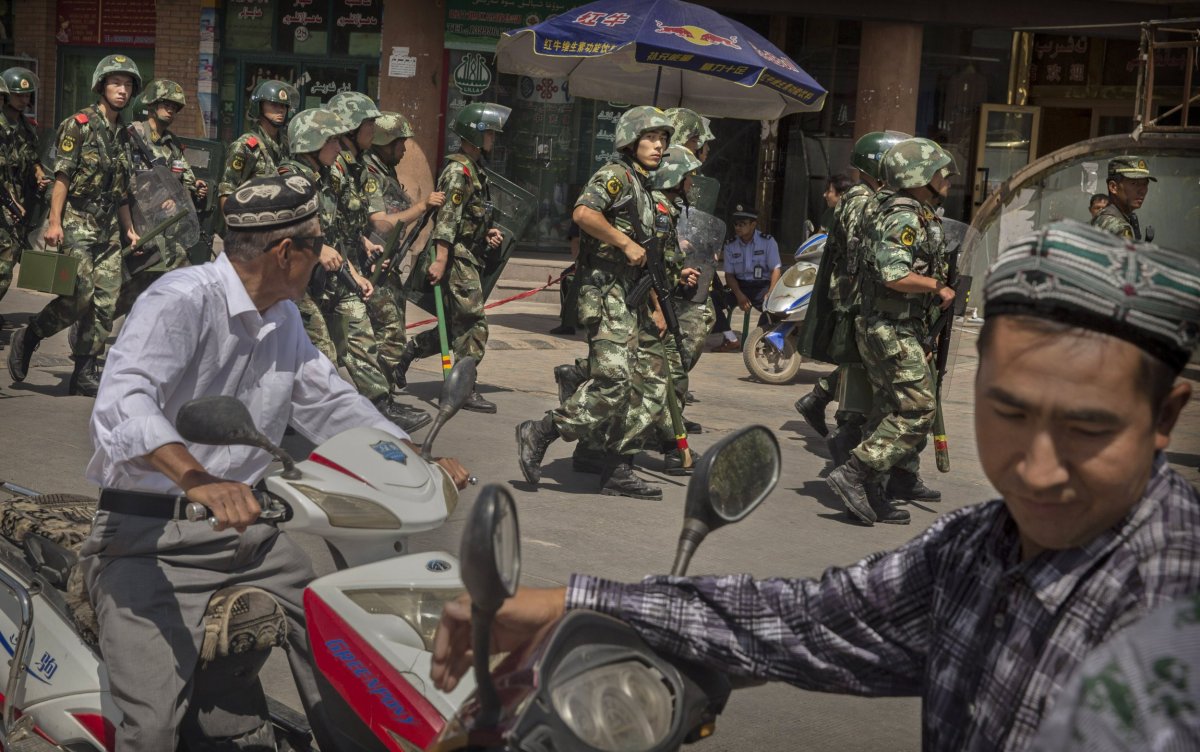
Former prisoners of Chinese "re-education" camps for Muslims have said they were forced to drink alcohol and eat pork as part of Beijing's efforts to stifle dissent and ensure compliance with the central government.
As many as 1 million Chinese Muslims are believed to have been detained in the camps. They are primarily from the province of Xinjiang, which has stubbornly resisted Beijing's efforts to instill Chinese culture. Former inmates of the camps have now told The Washington Post just how far China is willing to go to crush opposition.
Prisoners were subject to brainwashing, humiliation and torture to make them willing subjects of the Chinese Communist Party and President Xi Jinping. With no access to legal representation and no official charge, the prisoners were helpless.
Kayrat Samarkand told the Post he was detained for three months after returning from a trip to Kazakhstan. Samarkand said he was forced to study Chinese propaganda for hours and give praise to Xi. "Those who disobeyed the rules, refused to be on duty, engaged in fights or were late for studies were placed in handcuffs and ankle cuffs for up to 12 hours," he recalled.
Other inmates supported Samarkand's claims. Former prisoner Omir Bekali was arrested while on a trip from his home in Kazakhstan to visit his family. He said that those suspected of being extremists were forced to drink alcohol, and both men said prisoners were made to eat pork as a punishment. Consumption of both products is forbidden by Islam.
Samarkand and Bekali were eventually released, and both now live in Kazakhstan. But the memory of the camps looms large. "I still think about it every night, until the sun rises," Bekali told the Associated Press. "I can't sleep. The thoughts are with me all the time." Since his release, Bekali's sister, mother and father have all been sent to the camps.

In a report released Tuesday, Adrian Zenz of the European School of Culture and Theology in Korntal, Germany, claimed that China's crackdown on Islam "is, more than likely, the country's most intense campaign of coercive social re-engineering since the end of the Cultural Revolution."
Though the Chinese government denies the existence of the camps, Zenz said he believes a significant proportion of the 11 million Muslims in Xinjiang have been detained. He estimated that anywhere from several hundred thousand to over 1 million people have been sent to the camps.
Zenz claimed widespread detentions began in March 2017 and presented evidence of 73 government projects valued at more than $100 million to create a network of facilities. Chen Quanguo was made party chairman in Xinjiang in August 2016, arriving from Tibet, where he spearheaded a similar process of Sinicization.
China is targeting Islamic extremists in Xinjiang, which it says are a threat to national security and have carried out multiple deadly attacks in Chinese cities. The region's predominant ethnic group, the Uighurs, have borne the brunt of the campaign. "The state's proclaimed 'war on terror' in the region is increasingly turning into a war on religion, ethnic languages and other expressions of ethnic identity," Zenz wrote.
Muslims are automatically under suspicion. Beijing has tried to stamp out Muslim identity by banning veils, long beards and Muslim baby names. Government officials are even sent to stay with families in Xinjiang to encourage indoctrination and discourage dissent.
Religions like Islam and Christianity, deemed "foreign" by Xi, have come under increasing pressure to Sinicize and reflect China's "socialist core values." The intensity of the Xinjiang program is unlikely to lessen, as the region becomes an ever more important hub for China's multibillion-dollar Belt and Road Initiative.
Xinjiang has been used as a testing ground for China's cutting-edge surveillance technology, Zenz said. The lessons learned here could be exported to assist Beijing's "social re-engineering efforts" throughout the rest of the nation.
Uncommon Knowledge
Newsweek is committed to challenging conventional wisdom and finding connections in the search for common ground.
Newsweek is committed to challenging conventional wisdom and finding connections in the search for common ground.
About the writer
David Brennan is Newsweek's Diplomatic Correspondent covering world politics and conflicts from London with a focus on NATO, the European ... Read more
To read how Newsweek uses AI as a newsroom tool, Click here.








